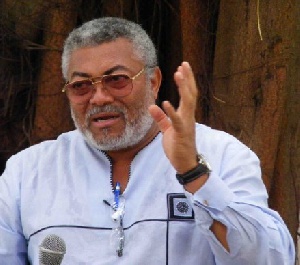 Former President Jerry John Rawlings
Former President Jerry John Rawlings
Former President Jerry John Rawlings has said history has been “re-hashed” and “re-cooked” to make him and other innocent people look guilty as far as the murder of three high court judges and an army major in 1982 is concerned.
In his view, the perpetrators of that crime some 36 years ago, were justly punished unlike the murderers of Ya Na Yakubu Andani, who, according to him, are still walking free.
Mr Rawlings’ comments come on the heels of a recent documentary on the murder of the three high court judges and a major in the army premiered by Multimedia.
On 30 June 1982, the three judges – Justices Kwadwo Adjei Agyepong, Poku Sarkodie and Mrs. Cecelia Koranteng-Addow, and a retired Major in the Ghana Armed Forces, were abducted and branded “enemies of the revolution” under the Provisional National Defence Council (PNDC) led by Mr Rawlings.
Lance Corporal Amedeka, Tony Tekpor and Dzandu, all soldiers, had taken their captives to the Bondase military firing range and executed them. The murderers carried along a gallon of petrol with which they set fire to the bodies to destroy all evidence.
But it rained that night, so the bodies did not burn as they murderers had wanted.
Following a public outcry, the PNDC set up the Special Investigation Board (SIB) headed by former Chief Justice Mr. Justice Azu Crabbe to unravel the mystery.
It turned out that all the three judges were sitting reviewing cases brought to them by aggrieved citizens in connection with the treatment meted out to them by the Armed Forces Revolutionary Council junta led by Mr Rawlings after the 4 June 1979 coup.
The army officer, Major Sam Acquah, was the head of administration at GIHOC who had signed letters that led to the dismissal of some agitating workers, including a PNDC member Joachim Amartey Kwei. Their services were terminated after they invaded Parliament House and destroyed property.
The SIB established that the abduction and murder was a plot hatched with the connivance of members of the PNDC. The Board found that the plot was master-minded by Capt. Kojo Tsikata, PNDC Member in charge of National Security. The PNDC rejected that aspect of the report and let Capt. Tsikata and four others off the hook for lack of evidence.
The remaining four of the nine suspects were jailed. When on 19 June 1983, there was a jail-break at the Nsawam Medium Prisons and the Ussher Fort Prisons, L/Cpl Amedeka escaped from captivity and has since not been seen. But his three accomplices, Tony Tekpor, Dzandu and Hekli, as well as ex-PNDC Members Amartey Kwei, were executed by firing squad.
Mr Rawlings has always insisted that before Amartey Kwei was executed, he confessed, at the stakes, to falsely accusing Mr Tsikata of involvement.
The entire history of the heinous act was recently retold in the “Who Killed the Judges” documentary.
But Mr Rawlings believes history has been skewed to make innocent people appear guilty.
In a tweet, the former Ghanaian leader said the following:
A whole documentary on the killing of the major and the judges.
An unfortunate tragedy that saw hard, swift justice done to the perpetrators unlike the organised assault and killings of the Ya Na and his 39 elders for which those perpetrators are yet to see justice. This is the fundamental difference – one group of four saw justice, the other group of close to 40 did not and has not!
We have re-hashed and re-cooked history to make innocent people look murderous. And in the next breadth, using the same name to endorse yourselves because Rawlings has said he is cultured (compared to his predecessors). This is vicious and callous political opportunism.
We cannot reduce the harm and pain caused families and the whole country by turning this matter into a political-media circus.
In the meantime, our party has lost a few too many thinkers and strategists to see things clearly. We fall for traps set easily. Rather than a focused fight to ward off this attempt to twist and manipulate the truth (which thankfully some started well) we are back to hang Rawlings because of the DG publications.